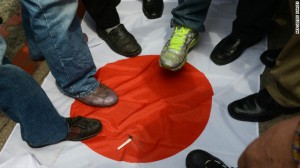[The Howdy Herald is a family/friendly newsletter I send out somewhat annually. It is full of Howden/Cartwright doings and musings. It may not be of any interest to you whatever.]
October 12. It’s a Friday afternoon in Dalian, Liaoning Province, People’s Republic of China, Asia, the World, Third Rock from a Modest Sun. I’m sitting in the 5th floor Reference Room of the School of International Business, a college at the university where Diana and I make our material living (and earn our visa privileges). The room has been mine for 90 minutes now, and there’s a pleasant breeze that seems to come straight from the scrub-forested hillside that fills the window to my left. It’s all I can see, and traffic sounds are fairly distant. Pleasant. I even hear the odd bird, and there aren’t too many in a city like Dalian, relatively clean though it is. This is a nice little zone. I should come here more often.
Yes, Sam and Diana and I are back in Dalian for our fourth China year.




